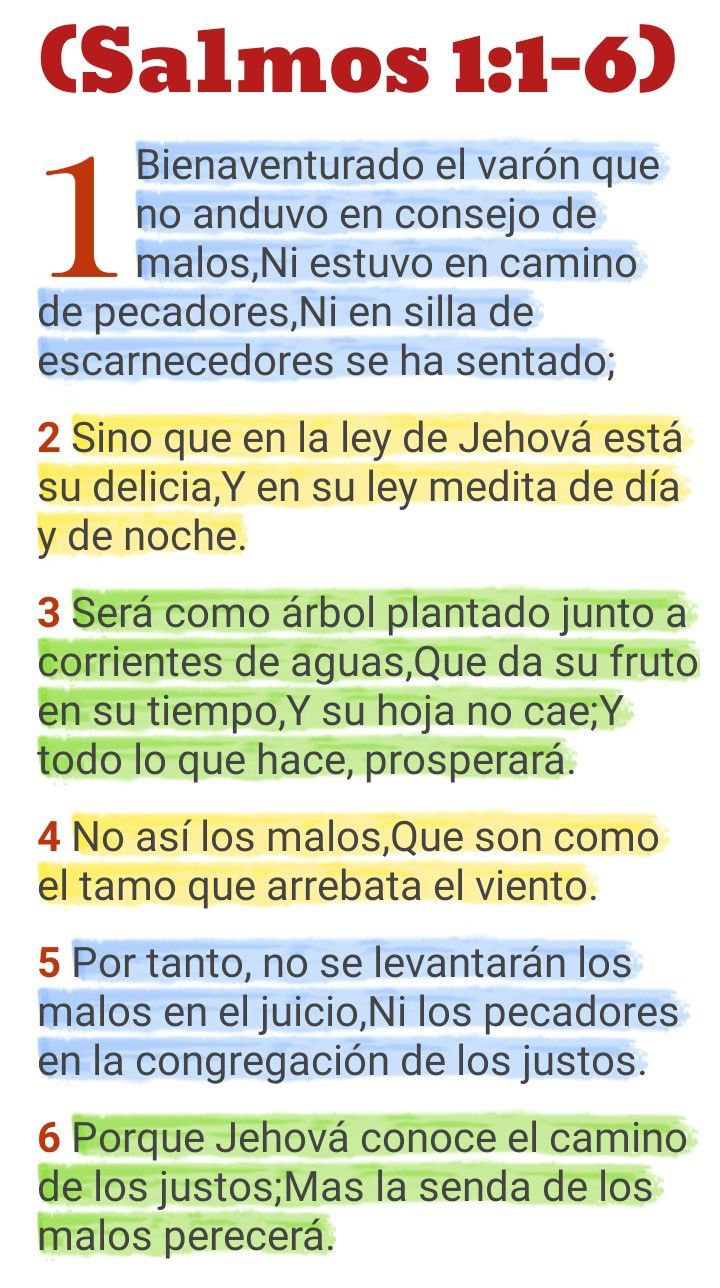Salmos 1

Psalm 1, often regarded as the gateway to the Book of Psalms, is a profound and timeless piece of ancient Hebrew poetry. Positioned strategically at the beginning of this sacred collection, it serves as a prelude to the entire Psalter, setting the tone for the spiritual journey that unfolds within its pages. Comprising a mere six verses, Salmos 1 encapsulates profound wisdom, offering guidance on righteous living and the consequences of aligning oneself with either the path of the righteous or the way of the wicked.
The Two Paths:
The central theme of Psalm 1 revolves around the stark contrast between two divergent paths—the path of the righteous and the way of the wicked. This poetic masterpiece opens with a poetic dichotomy, urging the reader to ponder the choices that shape one’s destiny. The righteous, likened to a tree planted by streams of water, flourish and yield fruit in due season. In contrast, the wicked are portrayed as chaff blown away by the wind, signifying their transitory and fruitless existence.
Rooted in Metaphor:
The use of vivid metaphors in Psalm 1 enhances its poetic beauty and imparts timeless wisdom. The image of a tree planted by streams of water conveys the idea of stability, nourishment, and growth. Just as a tree draws sustenance from a constant water source, the righteous find their strength and vitality in their unwavering connection with the divine. This metaphor resonates with the profound biblical motif of the righteous being firmly rooted in God’s Word.
Conversely, the chaff symbolizes the transience and fragility of the wicked. Chaff, separated from the wheat during the threshing process, is lightweight and easily carried away by the wind. Similarly, the wicked are portrayed as individuals lacking substance and enduring purpose, blown away by the ephemeral winds of their own pursuits.
Meditating on God’s Law:
Psalm 1 emphasizes the pivotal role of meditating on God’s law as the key to righteous living. The blessed individual finds delight in the law of the Lord, meditating on it day and night. This practice serves as a source of spiritual nourishment, deepening the connection with the divine and fostering a heart attuned to God’s will. The act of meditation implies a deliberate and continuous reflection on the principles of God’s law, leading to a transformative inner life.
The Fruits of Righteousness:
The fruitful imagery of Psalm 1 highlights the abundant blessings that accompany a life rooted in righteousness. The righteous individual is likened to a tree bearing fruit in its season—a symbol of prosperity, abundance, and spiritual maturity. This fruitful existence is not haphazard but a natural outcome of a life deeply anchored in God’s Word. The righteous person’s actions, words, and character become a testament to the transformative power of divine guidance.
In contrast, the wicked are portrayed as individuals who, due to their rejection of God’s law, bear no fruit. Their lives lack the richness and depth that come from aligning with the divine principles. The absence of fruit serves as a metaphor for the emptiness and futility inherent in a life devoid of righteousness.
The Way of the Wicked:
Psalm 1 does not merely extol the virtues of righteousness but also provides a sobering portrayal of the consequences of following the way of the wicked. The wicked are destined for judgment and separation from the community of the righteous. The imagery of being blown away like chaff underscores the fleeting nature of their pursuits and the ultimate emptiness of a life detached from divine principles.
Conclusion:
Salmos 1 serves as a powerful introduction to the Book of Psalms, offering a timeless message of wisdom and guidance. Its poetic language, rich metaphors, and profound insights make it a source of inspiration for individuals seeking a deeper understanding of righteous living. As we delve into the verses of Psalm 1, we are invited to reflect on the choices that shape our journey, the importance of grounding ourselves in God’s Word, and the transformative power of a life lived in alignment with divine principles. In the tapestry of the Psalter, Psalm 1 stands as a foundational thread, weaving together the themes of righteousness, meditation on God’s law, and the consequential paths that define the human experience.





